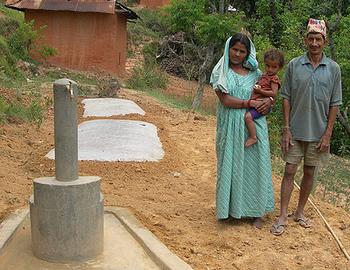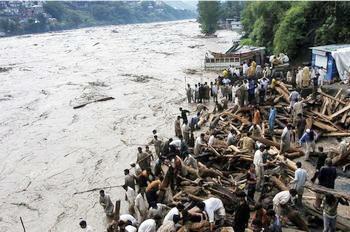Rich Nations Fail to Keep Copenhagen Climate Funding Promise
LONDON, UK, November 22, 2020 (ENS) – Rich countries are failing to keep the $30 billion promise they made last year to provide “fast-start climate finance” to help the world’s poorest countries adapt to the impacts of climate change, says the International Institute for Environment and Development in a new report published ahead of the United Nations climate change negotiations, opening November 29 in Cancun, Mexico.
“In last December’s climate summit in Copenhagen the developed countries committed to provide developing nations with US$30 billion between 2010 and 2012, with the money balanced between funding for mitigation and adaptation projects,” says Achala Chandani of IIED. “Our research shows that the developed countries have failed to meet their responsibility to help poorer nations.”
 |
A multi-use water system in Nepal provides safe drinking water and drip irrigation for farmers, helping them adapt to climate change. (Photo courtesy USAID and Winrock International) |
Climate change impacts the supply, quantity, and quality of drinking water. Adaptation funding can help ensure consistent water supplies. Restoring degraded land promotes carbon dioxide uptake by forests and builds resilience against climate change.
Funding pledges made since the Copenhagen meeting are far from balanced, with very little earmarked for projects that would enable developing nations to enhance their resilience to climate change impacts on agriculture, infrastructure, health and livelihoods, the study finds.
“Only US$3 billion has been formally allocated for adaptation,” says Dr. Saleemul Huq of IIED. “There is also a danger that some of this could come in the form of loans which would further indebt already poor nations and force them to pay to fix a problem that the developed nations created.”
It is unclear how the money will be disbursed, what type of projects it will support, and how the global community will be able to track adherence to pledges and ensure that the funding is truly new and additional to existing aid budgets, the IIED researchers warn.
“Currently there is no common framework to oversee, account for and enforce the delivery of the money that rich nations promised to support adaptation to climate change in developing nations,” says Dr. J. Timmons Roberts, director of the Center for Environmental Studies at Brown University and co-director of the AidData project.
“Industrialized nations seem to think they can get away with an anything goes approach where whatever they describe as adaptation funding counts,” said Roberts. “The danger is that existing development projects that are not specific responses to the threat of climate change will simply be relabeled as climate adaptation projects.”
 |
Robert Orr addresses a news conference at UN Headquarters. (Photo by Mark Garten courtesy UN) |
But a senior UN official said today that the Cancun talks could yield real results although he was cautious to keep expectations realistic.
UN Assistant Secretary-General for Policy Planning Robert Orr told journalists at UN Headquarters in New York that he does not expect the conference of parties to the UN Framework Convention on Climate Change, UNFCCC, to deliver a “final answer” on solving climate change but remained positive about the possibilities.
“Significant progress is possible in Cancun,” he said. “That is not to say that we expect all issues to be resolved. We need a package of decisions and outcomes. One or two [agreements] won’t an outcome create.”
The UNFCCC is an international treaty which addresses global warming and attempts to cope with global temperature increases. Some 36 countries and the European Union have approved an addition to the treaty, the Kyoto Protocol, which includes more powerful and legally binding measures.
The IIED researchers say that to rebuild trust on both sides of the North-South divide, industrialized countries should support an independent registry of climate adaptation funding measures under the UNFCCC and then provide it with detailed and timely data.
“We have technology now that would allow recipient governments and civil society groups of all types to add their own information about the progress and effectiveness of every adaptation project planned and underway,” said Roberts.
 |
In Pakistan, unprecedented floods displaced hundreds of thousands this monsoon season. (Photo by Joel Thomas) |
“By tracking funds all the way from taxpayers in developed nations to each expenditure in the developing countries, this system could create a new era in global cooperation, avoiding many of the pitfalls of past foreign aid,” he said.
David Ciplet, a researcher at Brown University who worked on the study, said, “The big promises for adaptation funding made at Copenhagen are not being met. Rather, a fragmented non-system for deciding what counts as adaptation funding is forming, and there is no way to truly measure whether the promises are being met.”
“Adaptation funding is absolutely crucial for the billions of people who face the rising intensity of climate disasters, but making promises is only the first step,” said Ciplet.
“What matters now is that developed countries make good on their promises and provide the funding needed to enable vulnerable countries and communities to increase their resilience to climatic threats such as droughts and floods, rising sea levels and new risks from diseases and crop pests.”
At UN headquarters, Orr said the longer countries put off funding climate solutions, the more expensive it will be, but he held out hope for progress in Cancun.
“There are enough issues that are close to resolution that give us hope that an important outcome could be achieved in Cancun,” Orr said. “Negotiators need to remind themselves that the longer we delay, the more we will pay; both in terms of lives and in terms of money.”
Copyright Environment News Service (ENS) 2010. All rights reserved.
© 2010 – 2012, Environment News Service. All rights reserved. Content may be quoted only with proper attribution and a direct link to the original article. Full reproduction is prohibited.
